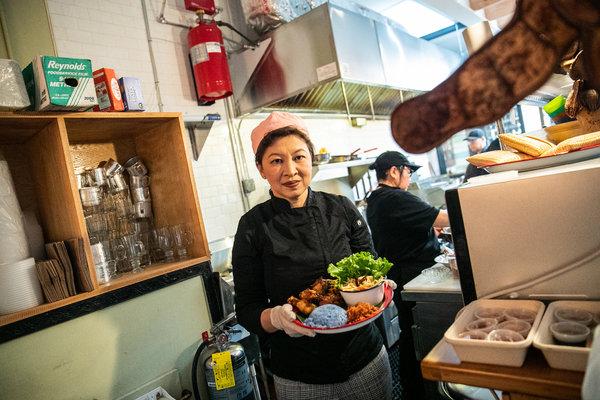Wun maprao onn — or Coconut Delight, as the Bangkok-born Jess Calvo of Thai Farm Kitchen in Kensington, Brooklyn, calls it — is “the most difficult dessert to make,” he said. “First, you have to find the right young coconut.”
This was a slightly easier task when he lived with ready access to coconut trees, in Nonthaburi Province just outside Bangkok. There he and his wife, Elizabeth Kanyawee Calvo, ran a hydroponic farm and three celebrated restaurants. Then they sold everything, moved to Brooklyn and opened Thai Farm Kitchen in Kensington in October.
Here, once a suitable young coconut has been procured — heavy and silent when shaken, because it’s so full of water, there’s no space for slosh — it’s boiled whole, to concentrate the sweetness and loosen the flesh inside. Then the top is lopped off, and the water is drained, cooked with agar-agar until near syrup and returned to the shell to set overnight.

Elizabeth Kanyawee Calvo, the chef, brought her grandmother’s recipes from Bangkok to Kensington, Brooklyn.CreditJeenah Moon for The New York Times
The coconut arrives agape, the shell framing a delicate, clouded jelly. At the center is a whorl of creamy white flesh, wobbly as custard. Everything keeps slipping off the spoon. The struggle — to make it, to eat it — is worth it.
Dish after dish at Thai Farm Kitchen reveals the same quiet intent and zeal for detail. Pad phed pla, catfish in red curry, is strewn with fresh green peppercorns still clustered on tiny branches; they pop brightly between the teeth. A larb of duck — roasted, minced and mined with crackly khao khua (toasted rice powder) and enough chiles to make you stutter — comes with little disks of baby Thai eggplant, whose bite is as crisp as a pear’s.
For nua toon, beef shank is mobbed by galangal, lemongrass, pandan leaves and a horde of other aromatics and left to unravel at a low simmer for a couple of hours. The resulting broth is crystalline and thin but rich, each spoonful a renewal. High notes of cinnamon and star anise hint at, without quite resolving into, sweetness.
I couldn’t help myself from ordering kao thod naem klook on every visit, even when I was supposed to be exploring new corners of the menu. It’s a plate of golden rubble: deep-fried rice balls limned by red curry paste, crushed into a heap of herbs and littered with pink twists of fermented pork sausage that match salt with sour.
Many of the recipes Ms. Calvo inherited from her grandmother, like hor mok, a half-mousse, half-custard of coconut milk (sieved in-house from a mixture of coconut flesh and water) and pulverized fish. This is studded with shrimp, squid and more fish, and steamed inside a young coconut shell suspended in a pot over boiling water. It’s so thick, you almost carve it.
In ethos, Thai Farm Kitchen is aligned with a number of its Brooklyn neighbors: The Calvos are committed to honoring the connection between land and table, and to using as many organic ingredients as possible. Quinoa makes an unexpected appearance, scattered over fried rice for a touch of chewiness; zucchini, pulped for juice, brings lushness to green curry, whose color and potency also derive from kale.
It’s a credit to the depth of Ms. Calvo’s cooking that these additions seem utterly natural, adaptations to the local environment rather than intrusions. Throughout the meal, chiles maintain a steady but unhectoring presence, at times forthright but mostly conspiring in the background to make the other flavors stronger.
Afterward, if Coconut Delight is not available — the right young coconut not having been found — there may be mango and sticky rice saturated with coconut milk and stained purple-blue from butterfly pea flowers, under a sift of crisp split mung beans; or mashed taro and sticky rice flour massaged into a dough, rolled into pearl-size dumplings and tumbled into coconut cream.
The Calvos have made the most of the narrow room, split lengthwise between a handful of dining tables and the open kitchen. Leafy plants hang from a lashed-bamboo lattice on the back wall. A woven chicken coop shades a lamp. Water is poured into hammered tin cups, and Ms. Calvo circles the room replenishing plates with rice from a gleaming and seemingly bottomless bowl.
The soft-spoken Mr. Calvo, who greets diners with a wai — the Thai gesture of pressed palms and bowed head — worked for years as a corporate executive, a memory that still makes him shudder. “I was very bored,” he said. “My dream was always to be a farmer.”




